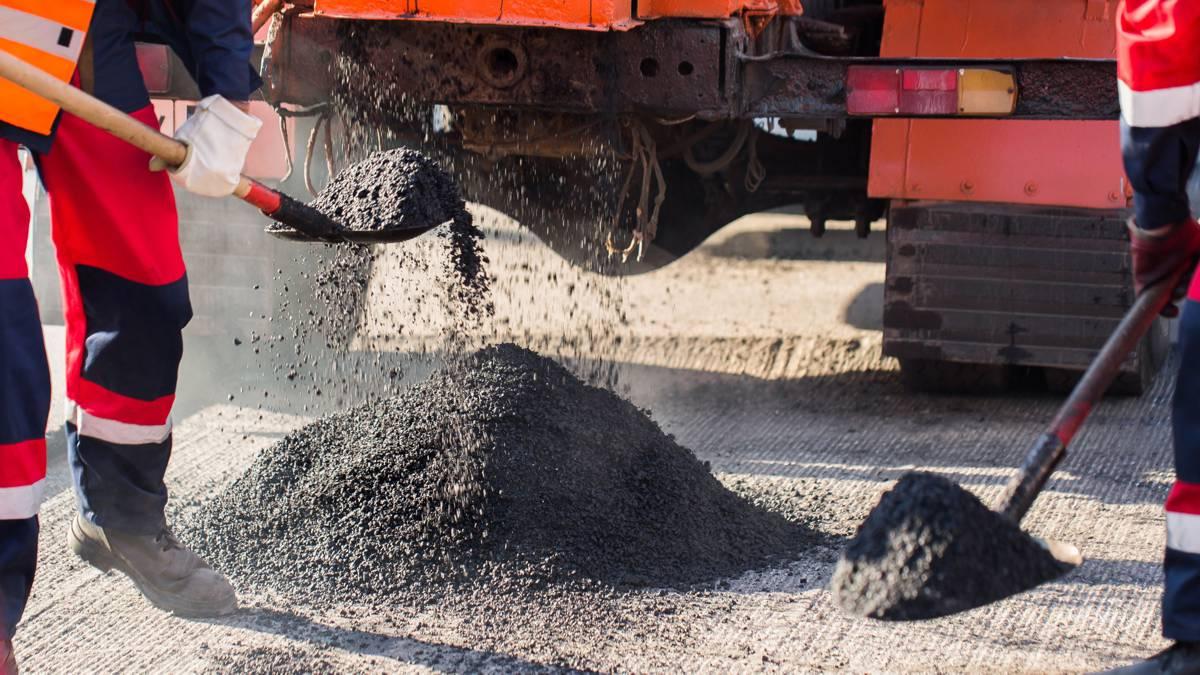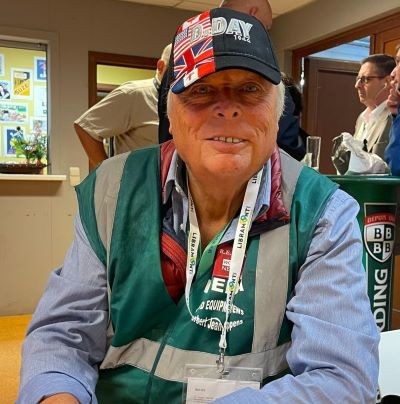Aston University and Miles Macadam developing Sustainable Road Surfaces
 29/07/24-FR-English-NL-footer
29/07/24-FR-English-NL-footer
L'Université Aston et Miles Macadam développent des revêtements routiers durables
 Image- Aston University
Image- Aston University
Les experts en génie civil de l'Université Aston s'associent à l'entreprise de construction et de revêtement Miles Macadam pour contribuer à rendre les revêtements routiers plus durables.
L'université a conclu un partenariat de transfert de connaissances avec l'entreprise basée dans le Cheshire, qui fabrique et installe du « macadam coulis », un matériau à base d'asphalte et de ciment pour les revêtements routiers et industriels.
Un partenariat de transfert de connaissances est une collaboration à trois entre une entreprise, un partenaire universitaire et un chercheur hautement qualifié, appelé associé de partenariat de transfert de connaissances. Le programme à l'échelle du Royaume-Uni aide les entreprises à améliorer leur compétitivité et leur productivité grâce à une meilleure utilisation des connaissances, de la technologie et des compétences.
Aston University est l'un des principaux fournisseurs de partenariats de transfert de connaissances dans le secteur, avec 80 % de ses projets achevés étant classés comme très bons ou exceptionnels par Innovate UK, l'organisme national.
Les coulis que Miles Macadam utilise dans ses produits de revêtement contiennent des cendres volantes, un déchet des centrales électriques au charbon, qui doit désormais être importé. De ce fait, la qualité de ces cendres volantes est variable et l’approvisionnement peut être irrégulier. Miles Macadam collabore avec l'Université pour trouver une alternative plus durable.
Andrew Scorer, co-directeur de Miles Macadam Ltd, a déclaré : « Il s'agit du premier partenariat de transfert de connaissances dans lequel nous participons et nous en sommes très enthousiastes, tout comme nombre de nos clients qui souhaitent vraiment que nous développions des produits plus durables. L'Université Aston possède clairement l'expertise dont nous avons besoin pour évaluer les différents ingrédients de nos coulis et nous sommes impatients de travailler avec l'équipe sur ce sujet.
Le projet explorera l’utilisation du biocharbon, un matériau riche en carbone issu du traitement de matières organiques telles que le bois ou des déchets agricoles à très haute température. L’utilisation de déchets permettrait également de conserver les ressources vierges et de réduire les coûts et la dépendance à l’égard des matériaux importés.
L’équipe produira et testera la capacité d’absorption de l’eau et la résistance des coulis durcis, notamment si les matériaux peuvent supporter des poids lourds. Ils utiliseront les installations d’essais environnementaux spécialisées de l’Université Aston pour voir comment les matériaux réagissent aux cycles prolongés de gel et de dégel, imitant les conditions météorologiques auxquelles ils peuvent être soumis lorsqu’ils sont utilisés. Une fois les meilleurs matériaux candidats identifiés, ils seront testés dans des conditions réelles sur un site Miles Macadam.
L'entreprise a choisi de s'associer à l'Université Aston car elle possède l'expertise en recherche nécessaire pour caractériser les alternatives aux cendres volantes et évaluer leur impact sur les performances, tant dans la manipulation du produit que dans ses propriétés finales.
Le Dr Moura Mehravar est le superviseur principal et le chercheur principal du projet. Le Dr Mehravar a déclaré : « Ce projet vise de manière ambitieuse à remplacer les matériaux cimentaires traditionnels par du biocharbon, réduisant ainsi considérablement les émissions de CO2. Mon rôle consiste à orienter le projet vers des résultats durables et pratiques, à encadrer les associés impliqués et à assurer un échange productif de connaissances entre le monde universitaire et l'industrie.
« Cet effort met en évidence notre engagement en faveur de pratiques de construction durables et nous place à l'avant-garde des efforts visant à réduire l'impact environnemental au sein de l'industrie de la construction. Grâce à ce projet, nous visons à découvrir des solutions innovantes qui contribuent à un avenir plus vert tout en faisant progresser notre compréhension et notre utilisation de matériaux de construction alternatifs.
L'universitaire principal est le professeur Mujib Rahman, ingénieur agréé avec plus de 20 ans d'expérience dans le domaine, dont cinq dans l'industrie. Il dirige le département de génie civil de l’Université Aston et possède une vaste expertise en recherche dans la caractérisation fondamentale des matériaux d’asphalte et de béton.
Le professeur Rahman a déclaré : « Ce projet rassemble différentes expertises de l'École d'ingénierie et des sciences appliquées de l'Université pour aider Miles Macadam à pérenniser ses produits et à réduire ses émissions de CO2 et celles de ses clients. Il sera fascinant d’examiner en profondeur les propriétés du biochar et de voir non seulement comment il peut répondre aux besoins particuliers de Miles Macadam, mais aussi comment il pourrait être utilisé dans de nombreuses autres situations. Il y a un énorme potentiel pour ce produit durable.
Le troisième membre de l'équipe de recherche est le Dr Jaiwei Wang, chef du Département de génie chimique et de chimie appliquée.
En collaboration avec Payam Sadrolodabaee, associé du partenariat de transfert de connaissances, ils effectueront des tests en laboratoire pour voir dans quelle mesure les matériaux alternatifs se mélangent bien aux coulis d'asphalte et de béton.
NJC.© Info Aston University
------------------------------------------------------------------------------------------------------------------
 29/07/24-English
29/07/24-English
Aston University and Miles Macadam developing Sustainable Road Surfaces
 Image- Aston University
Image- Aston University
Aston University civil engineering experts are teaming up with construction and surfacing company Miles Macadam to help make road surfaces more sustainable.
The University has entered a knowledge transfer partnership with the Cheshire-based firm, which manufactures and installs ‘grouted macadam’, an asphalt and cement-based material for road and industrial surfacing.
A knowledge transfer partnership is a three-way collaboration between a business, an academic partner and a highly qualified researcher, known as a knowledge transfer partnership associate. The UK-wide programme helps businesses to improve their competitiveness and productivity through the better use of knowledge, technology and skills.
Aston University is a sector-leading knowledge transfer partnership provider, with 80% of its completed projects being graded as very good or outstanding by Innovate UK, the national body.
The grouts that Miles Macadam use in their surfacing products contain fly ash, a waste product from coal-fired power stations, which now has to be imported. As a result, the quality of this fly ash is variable and the supply can be erratic. Miles Macadam is collaborating with the University to find a more sustainable alternative.
Andrew Scorer, co-director at Miles Macadam Ltd, said: “This is the first knowledge transfer partnership we’ve been involved in and we’re very excited about it, as are many of our clients who are really keen for us to develop more sustainable products. Aston University clearly has the expertise we need to assess the different ingredients for our grouts and we’re looking forward to working with the team on it.”
The project will explore the use of biochar, a carbon-rich material that is produced from processing organic matter such as wood or agricultural waste at very high temperatures. Using waste materials would also conserve virgin resources and reduce the costs and dependence on imported materials.
The team will produce and test hardened grouts for water absorbency and strength, including if the materials can withstand heavy weights. They will use Aston University’s specialist environmental testing facility to see how the materials respond to extended cycles of freezing and thawing, mimicking the weather conditions that they may be subject to when used. Once the best candidate materials have been identified, they will be tested in real-world conditions at a Miles Macadam site.
The company chose to team up with Aston University because it has the research expertise to characterise alternatives to fly ash and assess how they affect performance, both in the handling of the product and its final properties.
Dr Moura Mehravar is the lead supervisor and the principal investigator of the project. Dr Mehravar, said: “This project ambitiously aims to replace traditional cementitious materials with biochar, significantly reducing CO2 emissions in the process. My role involves steering the project towards sustainable and practical outcomes, mentoring the associates involved, and ensuring a productive exchange of knowledge between academia and industry.
“This endeavour highlights our dedication to sustainable construction practices and places us at the forefront of efforts to reduce environmental impact within the construction industry. Through this project, we aim to discover innovative solutions that contribute to a greener future while advancing our understanding and use of alternative construction materials.”
Lead academic is Professor Mujib Rahman, a chartered engineer with more than 20 years’ experience in the field, five of which were spent in industry. He leads Aston University’s Department of Civil Engineering and has extensive research expertise in the fundamental characterisation of asphalt and concrete materials.
Professor Rahman, said: “This project brings together different expertise from across the University’s School of Engineering and Applied Sciences to help Miles Macadam future proof their products and reduce their and their clients’ CO2 emissions. It’s going to be fascinating to look in depth at the properties of biochar and see not only how it can work for Miles Macadam’s particular needs, but also how it might be used in many other situations as well. There is huge potential for this sustainable product.”
The third member of the research team is Dr Jaiwei Wang, head of the Department of Chemical Engineering and Applied Chemistry.
Together with knowledge transfer partnership Associate Payam Sadrolodabaee, they will carry out laboratory tests to see how well the alternative materials mix into the asphalt and concrete grouts.
NJC.© Info Aston University
-----------------------------------------------------------------------------------------------------------------
 29/07/24-NL
29/07/24-NL
Aston University en Miles Macadam ontwikkelen duurzame wegdekken
 Image- Aston University
Image- Aston University
Civieltechnische experts van Aston University werken samen met bouw- en bestratingsbedrijf Miles Macadam om het wegdek duurzamer te maken.
De universiteit is een partnerschap voor kennisoverdracht aangegaan met het in Cheshire gevestigde bedrijf, dat ‘grouted macadam’ produceert en installeert, een materiaal op asfalt- en cementbasis voor wegen- en industriële bestrating.
Een kennisoverdrachtpartnerschap is een driezijdige samenwerking tussen een bedrijf, een academische partner en een hooggekwalificeerde onderzoeker, ook wel een kennisoverdrachtpartnerschap genoemd. Het Britse programma helpt bedrijven hun concurrentievermogen en productiviteit te verbeteren door een beter gebruik van kennis, technologie en vaardigheden.
Aston University is een toonaangevende aanbieder van partnerschappen voor kennisoverdracht, waarbij 80% van de voltooide projecten door Innovate UK, de nationale instantie, als zeer goed of uitmuntend wordt beoordeeld.
De grouts die Miles Macadam gebruikt in hun oppervlakteproducten bevatten vliegas, een afvalproduct van kolencentrales, dat nu geïmporteerd moet worden. Hierdoor is de kwaliteit van deze vliegas wisselend en kan het aanbod grillig zijn. Miles Macadam werkt samen met de universiteit om een duurzamer alternatief te vinden.
Andrew Scorer, mededirecteur van Miles Macadam Ltd, zei: “Dit is het eerste partnerschap voor kennisoverdracht waarbij we betrokken zijn geweest en we zijn er erg enthousiast over, net als veel van onze klanten die heel graag willen dat we ons ontwikkelen duurzamere producten. Aston University beschikt duidelijk over de expertise die we nodig hebben om de verschillende ingrediënten voor onze grouts te beoordelen en we kijken ernaar uit om er met het team aan te werken.”
Het project onderzoekt het gebruik van biochar, een koolstofrijk materiaal dat wordt geproduceerd door het verwerken van organisch materiaal zoals hout of landbouwafval bij zeer hoge temperaturen. Het gebruik van afvalmaterialen zou ook nieuwe hulpbronnen behouden en de kosten en de afhankelijkheid van geïmporteerde materialen verminderen.
Het team zal geharde voegmortels produceren en testen op waterabsorptie en sterkte, inclusief of de materialen zware gewichten kunnen weerstaan. Ze zullen gebruik maken van de gespecialiseerde milieutestfaciliteit van Aston University om te zien hoe de materialen reageren op langdurige cycli van bevriezen en ontdooien, waarbij ze de weersomstandigheden nabootsen waaraan ze bij gebruik onderhevig kunnen zijn. Zodra de beste kandidaatmaterialen zijn geïdentificeerd, zullen ze worden getest in reële omstandigheden op een locatie van Miles Macadam.
Het bedrijf heeft ervoor gekozen om samen te werken met Aston University omdat het over de onderzoeksexpertise beschikt om alternatieven voor vliegas te karakteriseren en te beoordelen hoe deze de prestaties beïnvloeden, zowel bij de verwerking van het product als bij de uiteindelijke eigenschappen ervan.
Dr. Moura Mehravar is de hoofdsupervisor en hoofdonderzoeker van het project. Dr. Mehravar zei: “Dit project heeft ambitieus tot doel traditionele cementgebonden materialen te vervangen door biochar, waardoor de CO2-uitstoot aanzienlijk wordt verminderd. Mijn rol bestaat uit het sturen van het project naar duurzame en praktische resultaten, het begeleiden van de betrokken medewerkers en het zorgen voor een productieve uitwisseling van kennis tussen de academische wereld en de industrie.
“Dit streven benadrukt onze toewijding aan duurzame bouwpraktijken en plaatst ons in de voorhoede van de inspanningen om de impact op het milieu binnen de bouwsector te verminderen. Met dit project willen we innovatieve oplossingen ontdekken die bijdragen aan een groenere toekomst en tegelijkertijd ons begrip en gebruik van alternatieve bouwmaterialen vergroten.”
De leidende academicus is professor Mujib Rahman, een erkend ingenieur met meer dan twintig jaar ervaring in het veld, waarvan vijf in de industrie. Hij leidt de afdeling Civiele Techniek van Aston University en beschikt over uitgebreide onderzoeksexpertise op het gebied van de fundamentele karakterisering van asfalt- en betonmaterialen.
Professor Rahman zei: “Dit project brengt verschillende expertises van de School of Engineering and Applied Sciences van de universiteit samen om Miles Macadam te helpen hun producten toekomstbestendig te maken en de CO2-uitstoot van henzelf en die van hun klanten te verminderen. Het zal fascinerend zijn om diepgaand naar de eigenschappen van biochar te kijken en niet alleen te zien hoe het kan werken voor de specifieke behoeften van Miles Macadam, maar ook hoe het in veel andere situaties kan worden gebruikt. Er zit een enorm potentieel in dit duurzame product.”
Het derde lid van het onderzoeksteam is dr. Jaiwei Wang, hoofd van de afdeling Scheikundige Technologie en Toegepaste Scheikunde.
Samen met kennisoverdrachtpartner Associate Payam Sadrolodabaee zullen ze laboratoriumtests uitvoeren om te zien hoe goed de alternatieve materialen zich vermengen met het asfalt en de betonmortels.
NJC.© Info Aston University
------------------------------------------------------------------------------------------------------------------
Date de dernière mise à jour : 25/07/2024

















